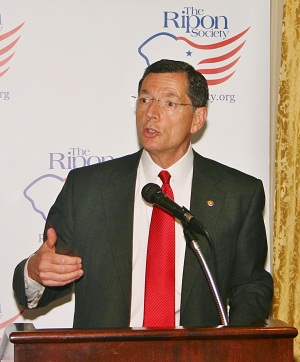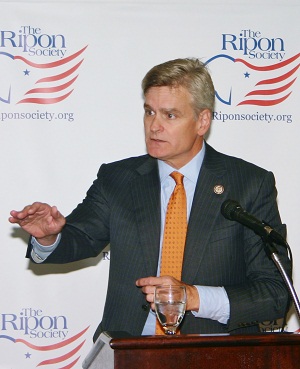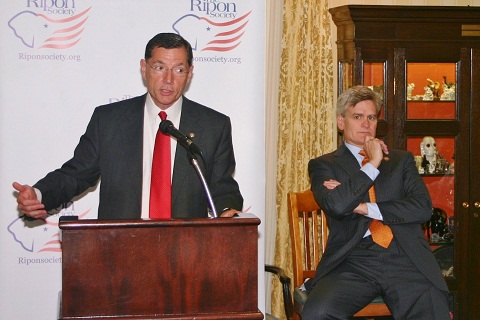Sen. Barrasso & Rep. Cassidy Discuss Republican Effort to Repeal the Affordable Care Act and the Importance of Reforming Medicaid Today

WASHINGTON, DC – With the Supreme Court ruling that the Affordable Care Act is constitutional and the House of Representatives voting again to repeal the law this week, The Ripon Society held a breakfast discussion yesterday morning to discuss the GOP effort to overturn the legislation and the importance of reforming Medicaid today.
The discussion featured Wyoming Senator John Barrasso and Louisiana Representative Bill Cassidy – a pair of lawmakers who are not only two of the Republican Party’s leading voices on the issue of health care reform, but also physicians who have spent decades caring for people in their home states and who understand the importance of preserving the doctor-patient relationship.
“Now that the Supreme Court has met,” Barrasso stated, “they’ve made their decision and the law has been declared constitutional. But just because it is not unconstitutional, it is still unworkable. It is still unpopular. And it is still unaffordable. You take a look at any piece of legislation, and you say the number one thing is — is it constitutional? Then number two — is it a good idea? Then number three — can we afford it? Even though it may pass the constitutional muster test, it is clearly not something that is a good idea in terms of how it is going to work, and it is not something that we as a nation can afford.”
“They say this election is going to be about economy. Well, this is absolutely about the economy. Gallup did a poll right after the Supreme Court ruling — July 2nd and 3rd: ‘Do you think the health care law upheld by the Supreme Court last week will help or hurt the national economy?’ Thirty-seven percent think it will help the economy. Forty-six percent say it will hurt the economy. And then if you go to independents, fewer independents think it will help. Only thirty-four percent – one in three independents –think it will help the economy. Forty-seven percent will think it will hurt the economy. So if this is an election talking about the economy, clearly there is a relationship between this health care law and the economy. And people still aren’t going to like this law.”
“The most astonishing thing was right after the Supreme Court ruling. The President went to the microphone. He said it was upheld. And he once again said: ‘If you like what you have, you can keep it.’ Either he is delusional or confused or being kept in the dark about these things. Millions and millions have lost the coverage that they have even if they like it. And the incentives for this program are for many, many to be dumped off the insurance they get through their work.”
Barrasso concluded his remarks by reiterating that the real problems with the Nation’s health system lie not with the quality of care, but with the inability to control costs.
“That’s where the President should have been focused,” the Wyoming Senator stated. “The President got so fixated on coverage. I think it’s going to bankrupt the country and I told the President that to his face in a meeting with Republicans over a year ago. He was very upset. But I still believe it’s true today. This is a health care law that this country cannot afford, and it’s not actually going to improve the health of American citizens. So I’m going to work to continue to repeal it and replace it with patient-centered reforms that will actually help people get the help that they need from the doctor they choose at lower costs.”
 In his remarks, Cassidy said he agreed with Barrasso’s assessment of the Affordable Care Act, and pointed to Medicaid as an area in immediate need of reform.
In his remarks, Cassidy said he agreed with Barrasso’s assessment of the Affordable Care Act, and pointed to Medicaid as an area in immediate need of reform.
“If what we’re talking about today is Supreme Court aftershocks, I would say Medicaid is the first shock felt,” he stated. “Because, really, the only thing that changed in that decision is Medicaid. That’s the only thing in terms of medical practice – the only thing that changed – is Medicaid. If you think about it, it changed in a way where we’re already seeing tectonic plates shift.”
“There are five or six states that said they will not take the Medicaid expansion. Another five or six that said they’re on the fence. Twenty-five or twenty-six have not signed it. If the goal of health care reform in terms of access is for those who are poorest – the linchpin has just been pulled. Isn’t it ironic? When we started this 3,000 pages of legislation ago, those were the folks who were most vulnerable then. And yet, those are the ones who are still most vulnerable today.”
“I will also say — whether there is a President Romney or a President Obama — Medicaid shall be reformed. Why do I want to say that? First, Simpson-Bowles said that health care entitlements – specifically Medicare and Medicaid — are driving our Nation’s debt. We all know that Admiral Mullen’s quote that ‘Our nation’s indebtedness is our Nation’s greatest threat to national security.’ Ergo, Medicare and Medicaid — unreformed — are our greatest threat to our national security. Now it isn’t just our Nation’s security we should be concerned about. States are spending for the first time more on Medicaid than they are on education. That’s a recipe for future disaster.”
To address this problem, Cassidy has introduced the Medicaid Accountability and Care Act (the MAC Act) – a bill, he said, that is based in part of his experiences as a doctor caring for people in the State of Louisiana.
“For twenty years, I’ve been working in a safety-net hospital,” he said. “I observed that whenever Medicaid was expanded, the lines in my safety-net hospital got longer. That’s counter-intuitive. Medicaid is insurance. If you have insurance, you should be able to go to see whomever you wish. But instead, my lines in the hospital for the uninsured were longer. Why? Well, I’ll tell you why.”
“Washington passes down an expansion, the state has this much money, they can either further cannibalize education, roads, or prisons, or you name it. Or, it can take the same amount of dollars it’s always had and spread them more thinly. So you end up paying providers less than their costs of seeing patients. California now pays $12 for a Medicaid dental visit. $12! You cannot turn on the light switch in that cap-and-trade state without spending $12. So clearly, we are now at a point that I call the ‘cross of death.’ The ‘cross of death’ is where your reimbursement falls so much below a provider’s cost of providing care, that it is death to access.”

“So what would I offer in return? Well, our MAC Act is a 40-page piece of legislation that I think truly brings in needed reforms. Its parentage is bipartisan. Phil Graham and Rick Santorum in the early 90’s promoted what was then the per capita cap, and Bill Clinton promoted the same thing.”
Cassidy introduced the MAC Act on June 20th . Among other things, the legislation would modernize Medicaid’s financing by controlling Federal outlays while simultaneously improving patient outcomes and addressing fraud. The bill would also provide for a Federal base payment for each Medicaid beneficiary regardless of where the beneficiary lived. The base payment would be adjusted for factors known to influence a patient’s cost of care.
“I do think we need to have a response not only to repeal, but which to replace,” the Louisiana lawmaker said. “I would argue Medicaid must be reformed whether we replace it or not. I think the MAC Act is the way to go.”
The Ripon Society is a public policy organization that was founded in 1962 and takes its name from the town where the Republican Party was born in 1854 – Ripon, Wisconsin. One of the main goals of The Ripon Society is to promote the ideas and principles that have made America great and contributed to the GOP’s success. These ideas include keeping our nation secure, keeping taxes low and having a federal government that is smaller, smarter and more accountable to the people.



